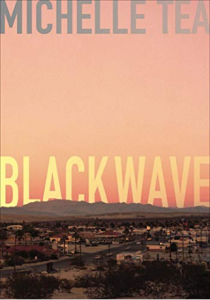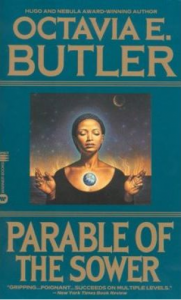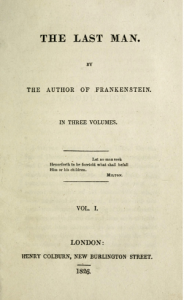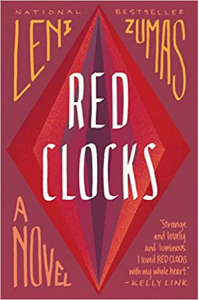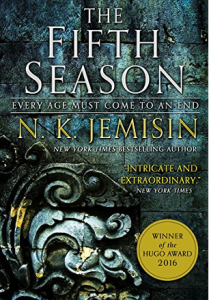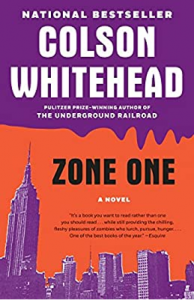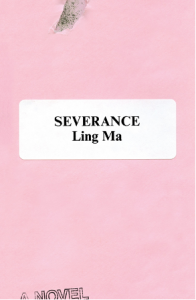Escapism is great. Many of us have been watching a lot of Great British Baking Show and playing Animal Crossing through the pandemic. But sometimes, in the face of crises, it can feel satisfying to watch or read something that reflects what’s happening around us. Often, we are drawn to fiction that vocalizes something we have experienced but have never been able to fully understand or explain. Maybe that’s why these books feel so comforting and exciting right now. The following novels are all fictional, of course, but their apocalyptic and dystopian plots resonant a little bit more than usual. If you’re looking to pick up novels exploring what it’s like to live through pandemics, climate change, and political turmoil, check out some of these titles.
Click on each book title for links to access through the University Library, or check out your local public library.
Black Wave by Michelle Tea (2015)
This apocalypse novel takes place in California in 1999, but in a version of 1999 where the world is officially ending in a year because the environment is too messed up. Michelle, the main character, leaves the San Francisco Queer scene for L.A., trying to escape drug problems and failed relationships. But with only a year left, people begin dreaming collectively, and the lines of reality are increasingly blurred. Somehow, this book will quell your existential dread about climate change, at least temporarily.
Parable of the Sower by Octavia Butler (1993)
Written by science fiction icon Octavia Butler, Parable of the Sower takes place in a dystopian version of California in the 2020s. The state is plagued by fires, water shortages, drugs, lack of jobs, and violence. Meanwhile, teenager Lauren Olamina struggles to survive and to protect the people she loves while living with hyperempathy, a condition causing her to feel the pain of others. Meanwhile, she develops a new religion she hopes can save humanity. Needless to say, there is a whole lot going on in this book, and its iconic for a reason.
The Last Man by Mary Shelley (1826)
Frankenstein author Mary Shelley’s dystopian apocalypse novel is set in the late 21st century after a plague has destroyed humanity. The plague first hits warmer regions of the world, sending refugees north to England. But eventually it spreads and kills almost everyone, along with other climate disasters like floods and extreme weather. Eventually, the narrator is the only human left on Earth, and the book is ultimately about isolation, something many of us have become more familiar with lately.
Red Clocks by Leni Zumas (2018)
In this near-future dystopian novel, abortion and in-vitro fertilization have become illegal in the United States with the Personhood Amendment, which grants rights to fetuses. The book follows five women living through the consequences of this legislation. If you liked The Handmaids Tale, this one’s for you.
The Fifth Season by N. K. Jemisin (2015)
Another one about climate change. This sci-fi novel takes place on a planet with one supercontinent and a fifth season that hits every few centuries, bringing devastating climate change along with it. Other planetary woes include a complex and oppressive caste system and a collapsing empire. Meanwhile, a woman tries to rescue her daughter as the world falls apart around her.
Zone One by Colson Whitehead (2011)
Written by Colson Whitehead, author of The Underground Railroad, Zone One is another novel about a pandemic. In this one, the virus is finally receding, but the zombies it created are still roaming Manhattan. Civilians team up to try to rid the island of zombies and resettle the city.
Severance by Ling Ma (2018)
Candance Chen is a millennial and a first-generation American living in New York City during a pandemic of Shen Fever, a fungal infection originating in China. Her boring office job is replaced with a cross-country trek for survival. It’s a science fiction satire of capitalism, with some eerie similarities to the pandemic we are all living through.
A Song for a New Day by Sarah Pinsker (2019)
In this science fiction novel, the government has made large public gatherings illegal due to virus outbreaks and terror attacks. Luce Cannon was a successful musician until concerts were banned, but she still plays illegally. Rosemary Laws, on the other hand is used to doing things virtually, until she goes out scouting musicians for her new job. This one isn’t exactly dystopian, but music lovers missing live shows will appreciate this story about sharing art and connecting in difficult times.
If you need a break from reality after reading these almost-real-life novels, check back next week for books that are easy to escape into!
Written by: Izzy
Edited by: Nicole


